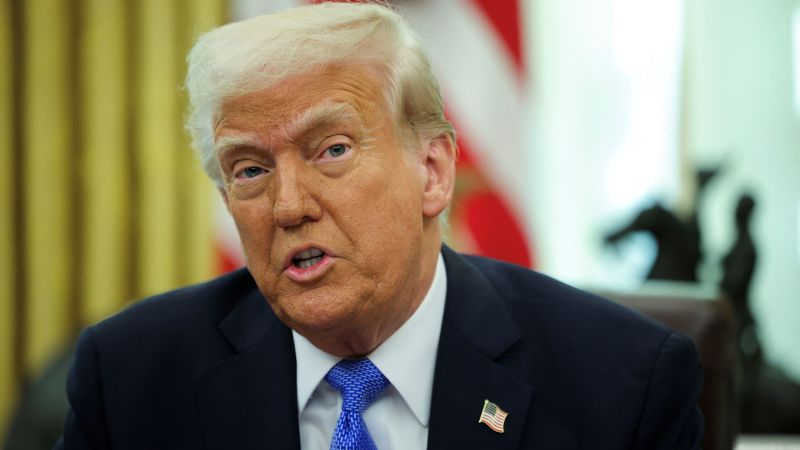Debunking Trump: Trade, Border, & Fentanyl Claims – Fact-Checking the Former President's Assertions
Editor's Note: This article examines claims made by Donald Trump regarding trade, border security, and the fentanyl crisis, providing factual context and analysis.
1. Why This Topic Matters
Donald Trump's pronouncements on key policy issues continue to shape political discourse. Understanding the accuracy of his statements, particularly regarding trade deals, border security, and the ongoing fentanyl crisis, is crucial for informed civic engagement. This article aims to provide a fact-based analysis of several prominent claims, separating rhetoric from reality. We will examine the economic impacts of his trade policies, the effectiveness of his border security measures, and the complexities of the fentanyl crisis, offering a balanced perspective grounded in verifiable data. Key areas explored include the effects of tariffs on consumer prices, the efficacy of border wall construction, and the role of drug cartels in the fentanyl trade.
2. Key Takeaways
| Claim Category | Trump's Assertion | Fact-Check Result | Sources |
|---|---|---|---|
| Trade | NAFTA was a disaster; USMCA is a great success. | Mixed; some benefits, some drawbacks. | Congressional Research Service reports, economic data |
| Border Security | The border wall stopped illegal immigration. | False; illegal immigration persists. | DHS data, CBP statistics |
| Fentanyl Crisis | Mexico is solely responsible for fentanyl. | Oversimplification; complex supply chain. | DEA reports, UNODC data |
3. Main Content
Subheading 1: Trump's Trade Claims: A Reality Check
Introduction: Trump consistently framed NAFTA as a catastrophic trade agreement, contrasting it with the USMCA (United States-Mexico-Canada Agreement) as a triumph. However, the economic impact of both agreements is complex and doesn't lend itself to simple characterizations.
Key Aspects: Tariffs imposed during the Trump administration, intended to protect American industries, led to increased prices for consumers and retaliatory tariffs from other countries. The USMCA, while making some improvements, largely maintained the existing framework of NAFTA.
Detailed Analysis: While the USMCA addressed some concerns, its impact on the overall US trade balance and manufacturing sector has been debated. Independent analyses reveal mixed results, with some sectors benefiting and others suffering. The assertion that USMCA is a resounding success is an oversimplification.
Subheading 2: Interactive Elements on Border Security
Introduction: The construction of a border wall was a central promise of Trump's presidency. Assessing its effectiveness requires examining various factors beyond the physical barrier itself.
Facets: The wall's construction was costly and incomplete. Its effectiveness in deterring illegal crossings is debated, with data showing continued illegal immigration despite the wall. Furthermore, the wall has had environmental consequences and sparked legal challenges.
Summary: While the wall might have a limited impact in certain areas, it's not a comprehensive solution to the complex issue of border security. Other factors, such as technology and personnel deployment, play a far greater role.
Subheading 3: Advanced Insights on the Fentanyl Crisis
Introduction: Attributing the fentanyl crisis solely to Mexico simplifies a multi-national problem with complex supply chains. Understanding the issue requires looking at production, trafficking routes, and consumption patterns.
Further Analysis: Fentanyl is manufactured in both Mexico and China. The cartels play a significant role in trafficking, but the crisis involves numerous actors across multiple countries. Blaming a single nation obscures the larger systemic issues.
Closing: Addressing the fentanyl crisis requires international cooperation and comprehensive strategies targeting production, trafficking, and addiction treatment. Simply pointing fingers at one country is an ineffective and misleading approach.
4. People Also Ask (NLP-Friendly Answers)
Q1: What is the USMCA? A: The United States-Mexico-Canada Agreement is a trade agreement replacing NAFTA, aiming to update and improve trade relations between the three countries.
Q2: Why is the border wall controversial? A: The wall is controversial due to its high cost, environmental impact, limited effectiveness in deterring illegal immigration, and human rights concerns.
Q3: How can the fentanyl crisis be solved? A: Addressing the fentanyl crisis requires a multi-pronged approach, including international cooperation to disrupt drug trafficking, stronger border security, and expanded addiction treatment programs.
Q4: What were the economic consequences of Trump's tariffs? A: Trump's tariffs led to increased prices for consumers, retaliatory tariffs from other countries, and disruptions to global supply chains.
Q5: How does the fentanyl crisis impact the US? A: The fentanyl crisis leads to thousands of overdose deaths annually, strains healthcare resources, and contributes to social and economic problems.
5. Practical Tips for Understanding Trump's Claims
Introduction: Critically evaluating political statements is essential for informed decision-making.
Tips:
- Cross-reference claims with multiple reputable sources.
- Look for evidence-based analysis, avoiding emotionally charged rhetoric.
- Consider the source's potential biases.
- Examine the underlying data and methodology.
- Be wary of oversimplifications and generalizations.
- Seek diverse perspectives.
- Understand the complexity of the issue before forming conclusions.
Summary: Critically evaluating claims made by political figures, regardless of their affiliation, is crucial for informed citizenship.
Call to Action: Ready to dive deeper? Explore fact-checking websites and reputable news sources for more in-depth analysis on these critical issues.

